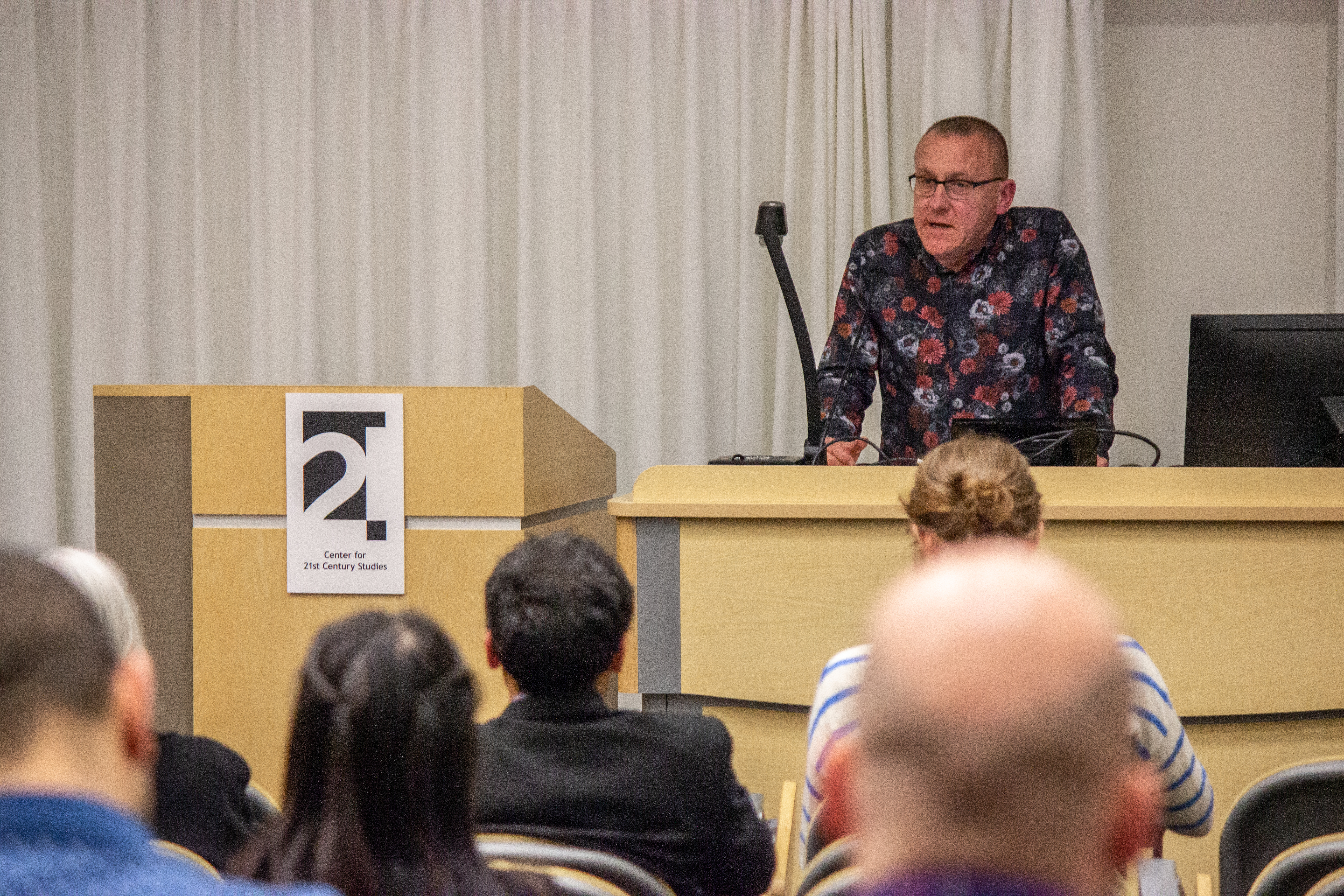

There is something powerful about beginning a conference centered on the concept of insecurity with a land acknowledgement. A relatively new tradition of the Center for 21st Century Studies, it is a welcome start to what will be a regaling talk on the origins of security culture not as something laudable, but as insidious, foolhardy and inherently productive of insecurity. Beginning the three-day conference with a stark reminder of the insecurity embedded in America’s past treatment of indigenous peoples, C21 Director Richard Grusin prefaces Mark Neocleous’ keynote, and the entire conference, with a reminder that the concept of insecurity is more capacious than its close relative precarity. Simultaneously, it stands as a challenge to the utopian notion of resilience, which often presumes trauma and shock are natural states of being. Ultimately, the proposed concept of insecurity promises room for a novel interdisciplinary approach to understanding the shifting landscapes upon which our societies are built, and Neocleous’ keynote is evidence of that promise. As the next hour and a half of the opening keynote unfolds, I am pushed to consider how the very guardians of our security often contribute to our insecurity to further their own aims.
Neocleous begins his aptly named “Security’s Insecurities” keynote with a lesson on the etymology of the word “security.” At present, the term security implies something positive: safety, protection, or perhaps even control over the indeterminacies of the world. It originated, however, as a term with primarily negative implications. Indeed, throughout early Christianity the term security is a pejorative. Based on an idea of removing worry, of being without care, security in its early uses was a largely internal feeling of stability or peace. . The internal nature of security is further evidenced in its use by Cicero, the term’s progenitor, who frequently used a similar word, salvus, when speaking of safety and freedom from harm. In a sense, Neocleous argues, security as originally imagined in this period is not safety but rather a sort of carelessness and accordingly the parent of negligence.
Through a masterful close reading of the 14th century fresco, “The Allegory of Good and Bad Government” painted by Ambrogio Lorenzetti in Siena, Neocleous argues that Securitas, the angelic female overseer of “good government town” in the fresco, draws her power from fear of death. Depicted holding the gallows in one hand, she punishes the guilty and in so doing “secures” the town. This depiction, one of security rooted in fear, captures how the concept of security shifts from the 14th century onward. It becomes one of prevention and of power.
Having made a compelling etymological case for why the term security is in fact rooted in death and negativity, Neocleous then continues his keynote by asking and answering the question, “Where, then, is insecurity?” Far from the opposite of security, he suggests that the two actually work in concert with one another. Security industries and complexes create insecurity so as to further their own power. The systems created to purportedly support “security”: the state, the military, the police, borders, and so on exist not to ensure safety but to enact surveillance. In doing so, they produce insecure subjects. The border exists because the state must exist. The state must exist to create national subjects who in turn rely on the state and the figures of power behind it. In this and other enactments, the question of death is buried beneath the performance of security and while we may feel free from care, we are far from safe.
Neocleous’ argument is fascinating and his suggestion that concepts such as “food security” and “health security” often serve only to obfuscate the contradiction at the heart of the security apparatus is bitingly poignant. Yet it is his response to a question posed during his Q&A that remains with me through the next few days of the conference and will likely remain with me longer still. Demurely, and with what sounded like a touch of fear, an audience member asks the simple question, “What is the opposite of insecurity, if not security?” to which Neocleous responds, “Solidarity.” Deeply resonant with my own research interests and even the talk I am slated to give at the conference, the idea that we are likely to find safety not in systems of security, but rather in community is a powerful one. Solidarity, not security, may stand a chance to stave off the insecurity that surrounds us.
Josh Rivers